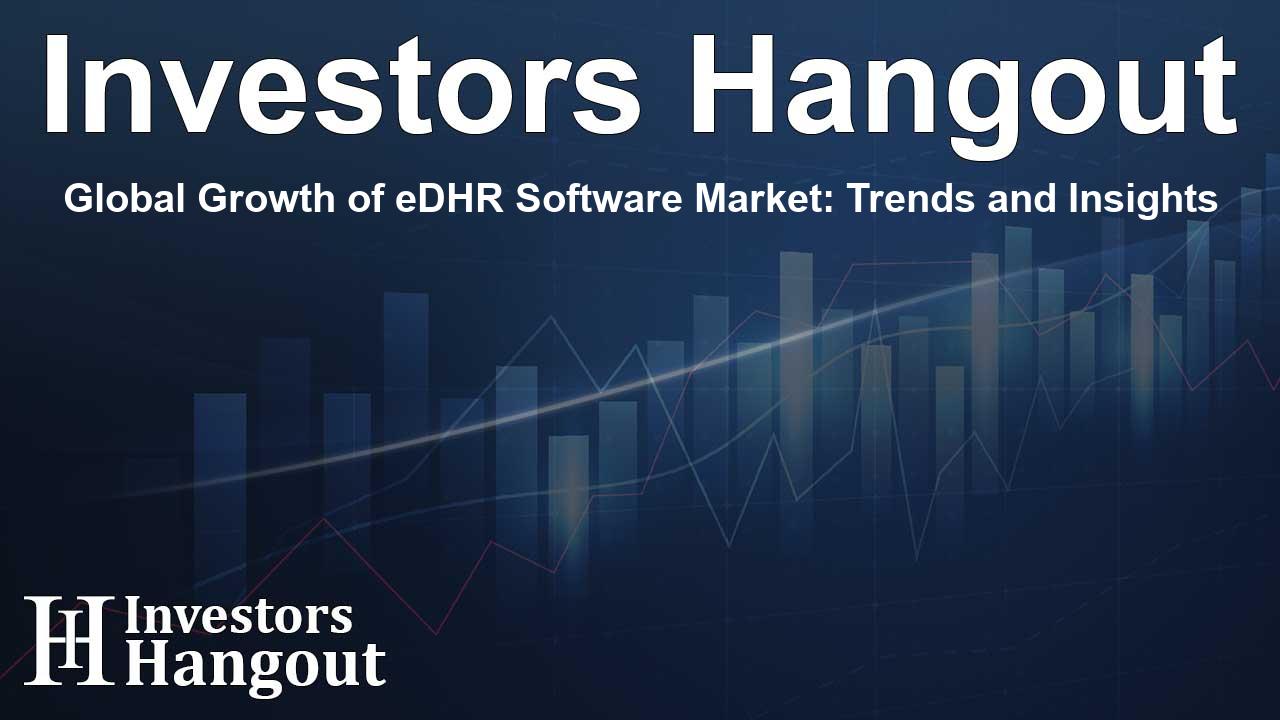Global Growth of eDHR Software Market: Trends and Insights

Expanding eDHR Software Market Outlook
The market for Electronic Device History Record (eDHR) Software is witnessing rapid growth. Valued at USD 311 million, it is expected to surge to USD 642 million by 2031, driven by a robust compound annual growth rate (CAGR) of 11.1% during the forthcoming years.
Key Drivers of Market Growth
Several vital factors are propelling this growth:
- A global shift towards digital manufacturing is enhancing the adoption of eDHR solutions.
- Increased automation in compliance processes is driving greater efficiency.
- There is a heightened focus on establishing operational transparency within organizations.
Market Composition
The eDHR software market features a mix of established enterprise software providers along with niche players specializing in life sciences and regulated sectors.
Crucial Industry Trends
Several trends are influencing the landscape of the eDHR software market:
Cloud Adoption
Cloud-based eDHR Software is swiftly becoming a primary choice for many companies, offering scalable and flexible data management solutions. Such platforms allow for secure remote access, real-time collaboration, and seamless integration with existing enterprise frameworks. This is particularly vital in the pharmaceutical and biotechnology sectors, where accurate batch records are essential.
On-Premise Solutions
Despite the rise of cloud solutions, on-premise eDHR Software remains crucial for sectors where complete control over data and infrastructure is paramount. This approach is favored by pharmaceutical manufacturers that require stringent data privacy and compliance with regulatory standards. On-premise systems continue to perform robustly, especially in environments with complex operational workflows.
The Impact of Regulations
Tightening regulations within the pharmaceutical and life sciences industries significantly boost the need for efficient eDHR solutions. Companies must maintain precise manufacturing records that comply with existing guidelines. eDHR platforms assist organizations in achieving compliance through features such as audit trails and electronic signatures, helping mitigate the risks associated with regulatory inspections.
Streamlining Batch Record Management
One of the essential advantages of eDHR Software is its capability to enhance batch record management. By digitizing manual processes, companies can eliminate human error and inefficiencies, which traditionally impact production timelines and product quality. This technology ensures automated approvals and real-time data capture, thus optimizing production processes.
Integration with Manufacturing Systems
The seamless integration of eDHR Software with Manufacturing Execution Systems (MES) and Enterprise Resource Planning (ERP) platforms is also fueling market expansion. Such integration grants organizations comprehensive visibility of the entire manufacturing lifecycle, leading to better data management and decision-making.
Key Product Types and Applications
The eDHR software market encompasses various products and applications:
Product Types
- Medical and Pharmaceutical Systems
- Industrial Solutions
- Manufacturing Software
Main Applications
- Medical and Pharmaceutical Requirements
- Industrial Sector Demands
- Manufacturing Industry Needs
Notable Players in eDHR Software
The competitive landscape features several key players:
- MasterControl
- Siemens Industry Software
- LZ Lifescience
- Engineering USA
- 42Q
- Idhasoft
- DATANINJA
- Dataworks
- Automated Control Concepts
- Camstar Systems
- Rockwell Automation
Market Regions and Shares
In the global eDHR Software market, North America currently dominates with over 40% share, followed by Europe holding approximately 27%.
Frequently Asked Questions
Q1: What are the major growth drivers for eDHR Software?
A: Key growth drivers include the shift to digital manufacturing, compliance automation, and the demand for transparency in operations.
Q2: Which companies are leading the eDHR software market?
A: Notable leaders include Siemens, MasterControl, and LZ Lifescience among others.
Q3: How is regulatory compliance affecting the eDHR market?
A: Increasing regulatory pressures are driving companies to adopt eDHR systems to ensure compliance and enhance quality management.
Q4: What advantages do cloud-based systems offer?
A: Cloud-based eDHR systems provide flexibility, cost-efficiency, and facilitate real-time collaboration, crucial for modern manufacturing.
Q5: Why do some companies still prefer on-premise solutions?
A: Organizations needing strict data control and customization often opt for on-premise solutions due to data privacy policies and legacy integration requirements.
About The Author
Contact Owen Jenkins privately here. Or send an email with ATTN: Owen Jenkins as the subject to contact@investorshangout.com.
About Investors Hangout
Investors Hangout is a leading online stock forum for financial discussion and learning, offering a wide range of free tools and resources. It draws in traders of all levels, who exchange market knowledge, investigate trading tactics, and keep an eye on industry developments in real time. Featuring financial articles, stock message boards, quotes, charts, company profiles, and live news updates. Through cooperative learning and a wealth of informational resources, it helps users from novices creating their first portfolios to experts honing their techniques. Join Investors Hangout today: https://investorshangout.com/
The content of this article is based on factual, publicly available information and does not represent legal, financial, or investment advice. Investors Hangout does not offer financial advice, and the author is not a licensed financial advisor. Consult a qualified advisor before making any financial or investment decisions based on this article. This article should not be considered advice to purchase, sell, or hold any securities or other investments. If any of the material provided here is inaccurate, please contact us for corrections.
